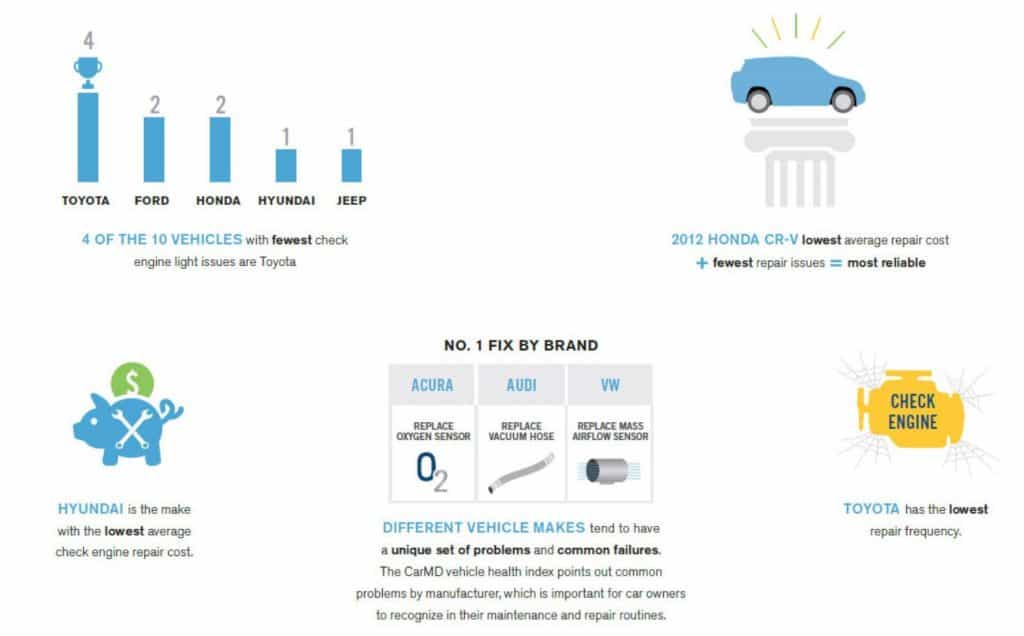 The CarMD Vehicle Health Index ranks the top 10 makes in each category, 100 vehicles with the fewest repair incidents, 100 vehicles with the lowest repair costs, top vehicles by category and the most common repairs by brand. Makes that faired well in the ranking include Toyota, Honda and Hyundai. Subarus appear to be on the road the longest.
The CarMD Vehicle Health Index ranks the top 10 makes in each category, 100 vehicles with the fewest repair incidents, 100 vehicles with the lowest repair costs, top vehicles by category and the most common repairs by brand. Makes that faired well in the ranking include Toyota, Honda and Hyundai. Subarus appear to be on the road the longest.
Makes and Vehicles with Lowest Repair Frequency
At least 10 percent of the cars and trucks on the road in the U.S. have a check engine light on, but which vehicle makes are least likely to need check engine repairs for their 1996 to 2016 model year vehicles? CarMD found that the following are the 10 brands with the lowest repair frequency over the past year:
- Toyota
- Honda
- Nissan
- Audi
- Volkswagen
- BMW
- Mercury
- Buick
- Jeep
- Hyundai
The index drills down to rank the 100 vehicles with the lowest average repair frequency among 8,500 different types of vehicles on the road. The no.1-ranked vehicle with the fewest check engine issues is the 2012 Honda CR-V, followed by the 2014 Toyota Tundra (no. 2), 2015 Toyota Camry (no. 3), 2015 Toyota Corolla (no.4) and 2014 Ford Explorer (no. 5). The complete list of 100 vehicles with the lowest average repair frequency is available online at https://www.carmd.com/wp/vehicle-health-index-introduction/2016-carmd-manufacturer-vehicle-rankings/.
According to CarMD, the five most common problems that triggered the “check engine” light on in 2015 were a faulty oxygen sensor, catalytic converter, ignition coil and spark plug, loose fuel cap and thermostat. They range in cost from $15 on average to replace a gas cap to $1,100 for a catalytic converter.
New to 10 most common repairs in 2015 were “replace evaporative emissions (EVAP) purge control valve ” and “replace EVAP purge solenoid.” These are both important parts designed to help make sure your car is not emitting too many pollutants. When they are not working properly they will cause your car’s check engine light to turn on and keep you from passing an emissions test.
Makes and Vehicles with Lowest Average Repair Cost
Of the 4.7 million vehicles reported to CarMD as needing repairs this past year, the make with the lowest average check engine-related repair cost was Hyundai, which had an average recommended parts and labor estimate of $318, followed by Mazda ($334) then Kia ($338). Chevrolet and Chrysler rounded out the top five, ranking fourth and fifth respectively in a virtual dead heat at $347 and change. Here are the 10 makes with the lowest average repair costs over the past year:
Hyundai ($318.50)
Mazda ($334.82)
Kia ($338.57)
Chevrolet ($347.28)
Chrysler ($347.86)
Dodge ($351.05)
Jeep ($357.97)
GMC ($362.76)
Ford ($372.80)
Buick ($373.07)
Buick, Hyundai and Jeep are the makes that appeared on both the CarMD Vehicle Health Index Repair Frequency and Lowest Average Repair Cost Top 10 lists.
This Index also ranks the top three vehicles on repair frequency and cost by category: Compact, Minivan, Sedan, Compact SUV, Full-Sized SUV, Wagon/Crossover and Hybrid. The Toyota Prius swept this year’s Hybrid category with its 2010 Prius earning the top spot on both lists, with an average repair cost of $445 and a low repair frequency. The 2015 Toyota Camry topped both lists in the Sedan category, with a low repair frequency and $169 average repair cost.
Common Repair By Brand
The CarMD Vehicle Health Index reports on common check engine-related repair needs by brand. For instance, “replace ignition coil” accounted for nearly 24 percent of Lincoln vehicle repairs; “replace ignition coil and/or spark plugs accounted for nearly 19 percent of Mini repairs; and just under 18 percent of recommended Subaru Check Engine repairs were “replace catalytic converter(s) with new OE catalytic converter(s).” While catalytic converters can cost upwards of $1,100 to replace, this repair is more commonly seen on vehicles as they age. Nearly two-third (71 percent) of the Subarus in CarMD’s database are 10-20 years old, telling us owners often keep their Subarus longer than the average vehicle age of 11.5 years.
The data for the 2016 CarMD® Vehicle Health Index™ Make and Vehicle Reliability Rankings was procured from CarMD’s database of verified repair needs. The 2016 Index analyzed repairs that apply to 229 million 1996 to 2016 model vehicles in the U.S. from Oct. 1, 2015 through Sept. 30, 2016. Rankings are not necessarily indicative of future reliability, as maintenance, upkeep and new recalls can affect a vehicle’s health and reliability.
This year’s Index is based on recommended repairs for 4.7 million model year 1996 to 2016 new and pre-owned vehicles in the United States from Oct. 1, 2015 to Sept. 30, 2016. .